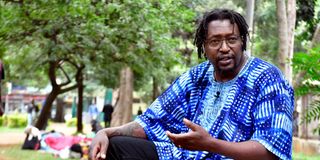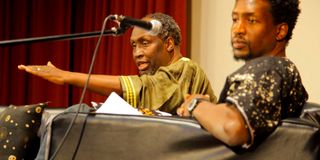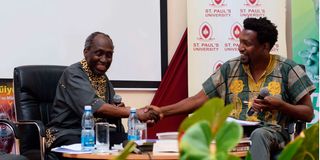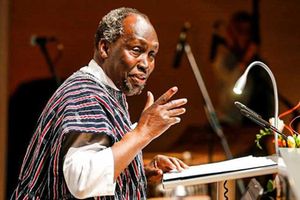
Prof Mukoma wa Ngugi, son of literary giant Ngugi wa Thiong'o.
Mukoma wa Ngugi, the fourth child of literary giant Ngugi wa Thiong’o and his first wife Nyambura, is a man who shoots straight.
When he shocked the world by alleging that his father used to assault his mother Nyambura, who died in 1996, the consequences were dire for him.
“We got estranged towards the end,” he says of his relationship with his father in his final days before the literary icon died on May 28.
Prof Mukoma, who teaches at Cornell University — an Ivy League institution in the US state of New York — had a lengthy interview with Nation journalists at Nairobi’s Jeevanjee Gardens on Thursday. He had planned to come to Kenya on June 9 but travelled earlier because of the death.
In the interview, he explained that it is his parents who taught him how to speak the truth. Below are the excerpts.
----------
Tell us a little bit about his final days. What was that like?
That’s difficult for me because, as most Kenyans and most people will know, because I did say he physically abused my mother, Nyambura wa Ngugi, we had a falling out — and we never recovered from that. I actually didn’t know he was dying until one of my brothers called me and said that he’s dying. I didn’t know he had gotten cremated because it started a whole family feud. But the one thing I can say about that is that I told the truth and my conscience is clean. There’s nothing more. In a way, he brought me up to be a truth-teller as best as I can. So, I can’t lie and say we spent the last few months together laughing and blah, blah, blah. No, it was full of tension and our family [was] divided.
Did you get to say goodbye?
No, no I did not, I did not get that chance because of the family feud. As happens with most families, there was a division. My siblings can explain for themselves why they decided not to tell me.

Prof Mukoma wa Ngugi (right) with his father Prof Ngugi wa Thiong'o (left) at a past event.
Regarding the cremation, have there been questions from your larger family? Are you the only one who didn’t know about it?
No, I’m not the only one. But I don’t want to get into that too much because I also don’t know. I’m in mourning, I’m in grief, but I also don’t know what’s been planned. But I do know, because I’ve been here [in Kenya] for two days now, that a lot of people are asking for a ceremony because people need closure. I know the larger Thiong’o family is asking the same questions. The writers are asking the same questions. I don’t have an answer unless somebody tells me. But part of it is because, you know, I’m not the family’s spokesperson.
How does his passing make you feel, especially after your claims that he physically abused your mother?
I think we have to admit to ourselves that there’s no human being without a contradiction-- and most families have their issues. In fact, when I said he physically abused my mother Nyambura wa Ngugi, there was a lot of division even on social media. But I think we have to acknowledge that we come with our contradictions. How does it make me feel? I don’t know. All I can say is I love him. In spite of that, I just love him. He’s my father, there isn’t more to it. I just love him and I’m sorry that we didn’t talk for the last three or four years. But I told my truth, and I think that’s fine enough.
But as human beings, we come with our contradictions and I think that’s my takeaway. I’m sure when my daughter grows up, she’ll have her own issues with me, as you will with your parents, as anybody else will.
Are you hopeful of reconciliation within your family after this?
Of course, yes. I do hope we can reconcile. I think that’s what my father would have wanted. I don’t have control over that, but I’ve always said — and I told him, and I told my siblings — that my doors and windows are always open. So, reconciliation (is good) because there’s no point of division. We do all this silly stuff, but for what, though?
I think our family isn’t peculiar. I think a lot of Kenyan families do the same thing. It’s a cliché, but it’s better when people stand together. So, let’s stand together as a family, but also stand together as a nation. But of course, also stand together against exploitation, theft, corruption and so on and so forth.
How do you think your mother shaped the person that the world knows today as Ngugi wa Thiong’o?
That’s a tough one. But if you read “The River Between”, there’s a Nyambura there. I would say in so many ways she’s the unsung hero of him becoming a hero for millions of people. But it’s not just her, though. You can talk about Winnie Mandela, you can talk about Shirley Dubois, you can talk about all these women who have been involved in struggle.
Maybe we should rephrase the question and say: Why don’t you remember the people who made what we call revolutionaries possible? Maybe we should rephrase the question and say: What’s wrong with us that we don’t recognise or we are so eager to recognise one person as opposed to the other people who made that person possible?
How does it feel to carry his name? Is there a weight that comes with that?
No, not really. And for me, I answered this question to myself years ago because I’ve met children who were part of the dictatorship, or their parents were part of the dictatorship, who carry all this guilt of their parents. For example, I met a daughter of somebody who was responsible for being part of the chain that put him [Prof Ngugi] in detention and she has so much guilt. She was apologising to me on behalf of her father. So, for me, I can say categorically that the one gift he has given me and my siblings is that we don’t carry any shame.

Prof Mukoma wa Ngugi (right) with his father Prof Ngugi wa Thiong'o (left) at a past event.
In a dictatorship, people have to pick sides, right? So, for me, I’ve never had to apologise for him. I’ve never carried any guilt about his politics. That’s not to say life wasn’t difficult. I mean, we’d get attacked by political thugs, police raids and so on and so forth. So, I’m not saying it didn’t come with a cost, but at least…I’m 54 now, but I can say that I’m proud of him actually for that.
We know there’s a family of Nyambura and Njeeri (Ngugi’s second wife). How many children were on each side and are they living together?
From the Nyambura side, we are seven. And then from Njeeri’s side, we are three. But for me, I do want to say that they’re my brothers and sisters. In my head, I don’t have that division. Culturally, it might matter, but in my head, and also in my heart, they’re my brothers and sisters, and nothing can change that.
In your birth records, do you have an English name?
That’s one thing I’m grateful that I was just named Mukoma. But I do remember growing up – I grew up in the 1970s – and the environment is thinking: if you’re born in the 1970s, it’s only seven or six years, or maybe eight after independence. But I do remember being asked, ‘What’s your name?’ I’d say ‘Mukoma’. Then they’d ask me, ‘What’s your real name?’ Then I’d say ‘Mukoma’. And then eventually they say, ‘What’s your English name?’
So, I think all Kenyans should be grateful to my father, because he changed that whole discussion. And also, he changed the Nairobi University. It was called English Department; he changed that to Department of Literature, together with others. So, I recognise the enormity of the work he did. Years later at Cornell, we changed the English Department’s name to Literatures in English.
What is something you think the public never understood about your father?
That one is funny in a way because he would tell me the story of when people would meet him thinking he’s tall and a giant. But instead they meet this short guy who is very humble. That’s the thing about him: always humble, interested in talking with people.
So, you have the public image of him as a mythical figure. And I think, for him, he’d get surprised when people would react to him that way.
You weren’t very close in his final years, but he lived far from Kenya. Was Kenya far from his mind?
No, no, it wasn’t. And he himself has said that even though he left for exile in 1982. He wrote a bunch of books after that. But for him, he does say that Kenya never left him. So, all his novels are based in Kenya. There [was] a point he’s in exile and Kenyans come to visit he and he sits down with them for hours just asking them details ‘how much is chai? How much is mandazi?’ just to reconnect or to get a feel of Kenya. So, that one I can say that it was heart-breaking for him not to be able to return and stay here because Kenya is his home.
What did you call him growing up? We knew him as a literary writer, Ngugi wa Thiong’o. But What did you call him?
No, we just said Fafa (laughs). I have a daughter and, of course, we’re in the US now. She started calling me ‘dad’, and I was like, ‘No, just call me Fafa.’ Yeah, so I’d just call him Fafa.
How did being his son shape your own voice as an individual, as a scholar and a writer?
I would say very heavily when I look at my own work. I also work on decolonisation and I started a Kiswahili [literary] prize. Even the way I see the world now, but also thinking about changing the world in little ways that anybody can, I would say he’s actually the major influence in my life. I cannot deny that. So, sometime back I said I’m me because of him, and maybe that’s the best way of putting it.
What would you want the world to remember about your father?
A brilliant writer, a loving but flawed father who was married to my mother, Nyambura wa Ngugi.






